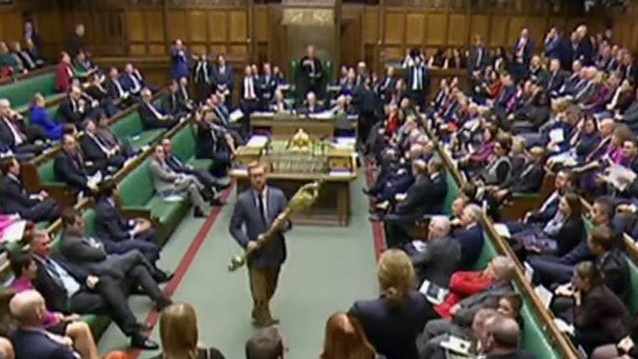Brexit: Amid MPs’ squabbles, a second vote is the only answer
As an MP seizes the ceremonial mace to show his contempt for the Brexit deal, another referendum is the only way out of the mess | WATCH

As if preparing for a major military operation, British government ministers have been counting down the days to the “meaningful vote” with the code used by army planners: D-3, D-2, D-1.
Yesterday was supposed to be D-Day for Theresa May’s Brexit deal but, facing certain defeat in the House of Commons, she delayed the battle. It was a sign of extraordinary weakness, and a personal humiliation for the Prime Minister.
It might help her buy some more time, but she has admitted that she cannot command the support of MPs on the most important policy implemented by any government for a generation.
This was aptly illustrated last night (AEDT) when Labour MP Lloyd Russell-Moyle seized the parliamentary ceremonial mace during proceedings. The mace symbolises royal authority - without it the House can't meet or pass laws and, while his actions caused uproar, they also showed how deep the passions go amongst MPs.
There is virtually no chance that the EU will agree to make substantial changes to the withdrawal agreement, so she will probably soon be annihilated in any case.
The Tory leader is like a child playing hide and seek who thinks that by covering her eyes she cannot be seen. She has managed to lose her authority in the Conservative party as well as in parliament. “She’s toast,” says one Tory MP. More importantly, however, the political process is deadlocked. The constitutional crisis that has been predicted for so long at Westminster is finally upon us.
There is, it seems, an unbridgeable divide between May and her party, between parliament and the executive, between Brexiteers and Remainers, between pragmatists and ideologues. Underlying all these tensions is the conflict between our representative democracy, in which MPs are elected to legislate in the national interest, and the direct democracy of the Brexit referendum.
Historically and constitutionally, MPs are the representatives, not the delegates, of their constituents. They are supposed to exercise their own judgment on behalf of the people who send them to Westminster. It is a concept best described by the Tory philosopher Edmund Burke, who told the voters of Bristol in 1774: “Your representative owes you not his industry only, but his judgment; and he betrays, instead of serving, you if he sacrifices it to your opinion.” That principle was fatally undermined by the decision to throw the vexed question of Britain’s relationship with the EU to the voters in a referendum.
Although legally, the result of the 2016 vote was only advisory, politicians felt morally bound by it. Many MPs are torn between their duty to do what they believe is right for the country and the political imperative to follow the “will of the people”.
If this is the real cause of the current political deadlock, then the logical way out is another popular vote. It is surely wrong to insist that public opinion is set in stone when the Prime Minister seems to change her mind on an hourly basis about what to do.
Defence Minister Tobias Ellwood tweeted last week that the mandate of the 2016 referendum “will begin to date” and “will eventually no longer represent a reflection of current intent”.
The Brexiteers denounce the so-called People’s Vote as a betrayal but can it really be a betrayal of the “will of the people” to ask the people to confirm their will? No one is suggesting that the 2016 result should be overturned, just that people should be asked whether they still want to leave now that it is clear what it means. Far from being an affront to democracy, it’s an assertion of democracy.
There was always an internal tension among Brexiteers about the meaning of “take back control” if Britain escaped the clutches of the EU. By appealing simultaneously to the ideological Eurosceptics, who were interested in sovereignty, and the white working-class voters, who cared more about immigration, the Leave campaign won the referendum but now the inherent contradictions are becoming clear.
It was extraordinary to see the Brexiteers denouncing last week’s Commons vote that gave MPs a say over what happens if May’s deal is rejected.
With judges denounced as the “enemies of the people” and Tory pro-Europeans condemned as “mutineers” the hardline Brexiteers apparently want to give control back only to people who will do what they say. It is deeply irresponsible to warn of civil unrest if the people are asked for their opinion on such a critical issue. The danger is that this becomes a self-fulfilling prophecy, with passions inflamed by the cries of betrayal.
In Whitehall everyone is “going round and round getting dizzy with all the permutations” as one minister puts it but the idea of another referendum is gaining momentum at the highest level.
David Lidington, May’s de facto deputy, has been talking to MPs who support a People’s Vote about how it could work. Work and Pensions Secretary Amber Rudd also says she “can’t understand the hysteria” around the idea of another referendum, pointing out that, while she would campaign to Remain, people would have every right to vote to Leave.
Several ministers are said to be ready to quit and support another popular vote if May’s deal is rejected by MPs — one has already written a resignation letter. Despite Labour leader Jeremy Corbyn’s reservations, his party is edging slowly but surely towards the idea.
There is a growing sense of inevitability about it. The political system is in meltdown, parliament is gridlocked and the Prime Minister has lost control of events. The government is doing nothing but Brexit and now it cannot even do that.
Another referendum is the only way out of this mess.
THE TIMES


